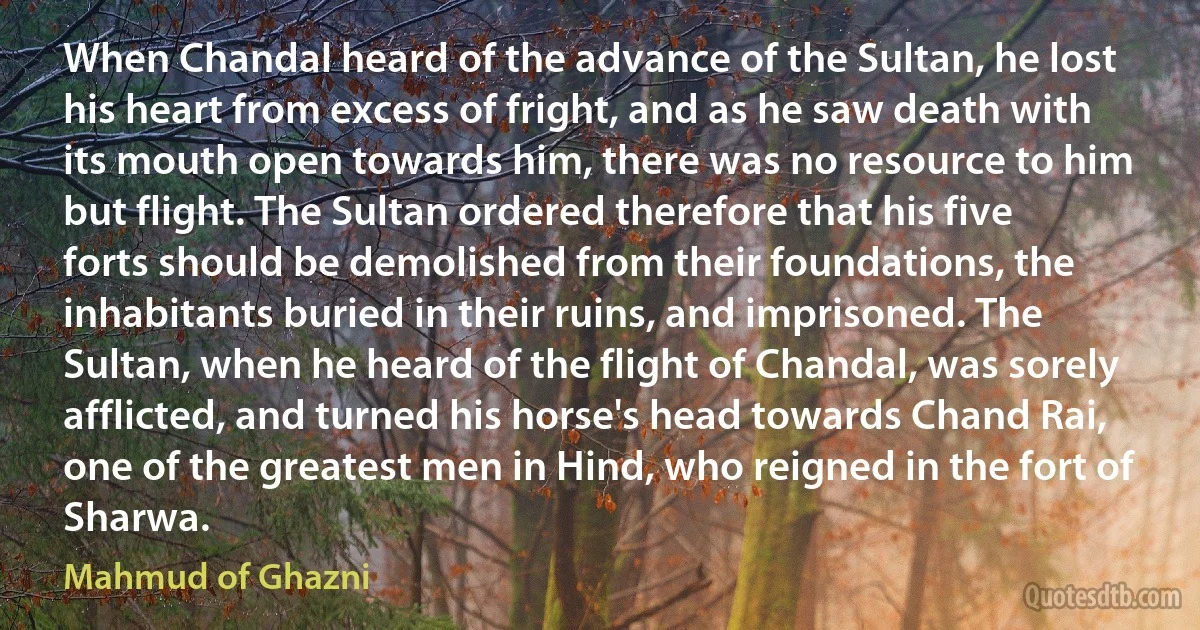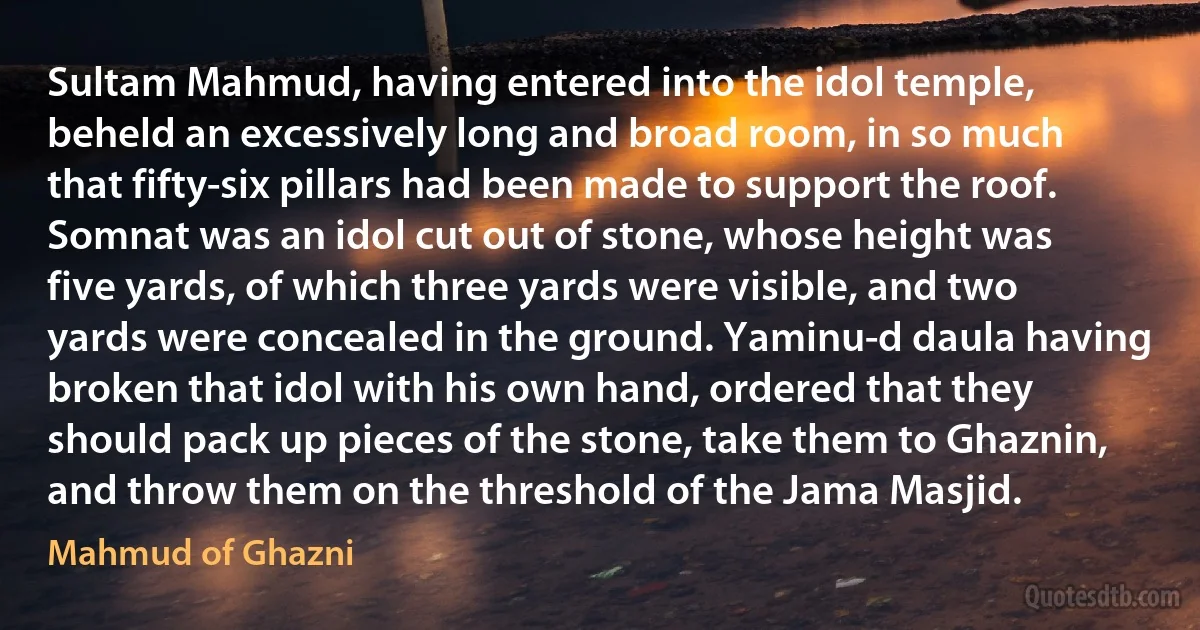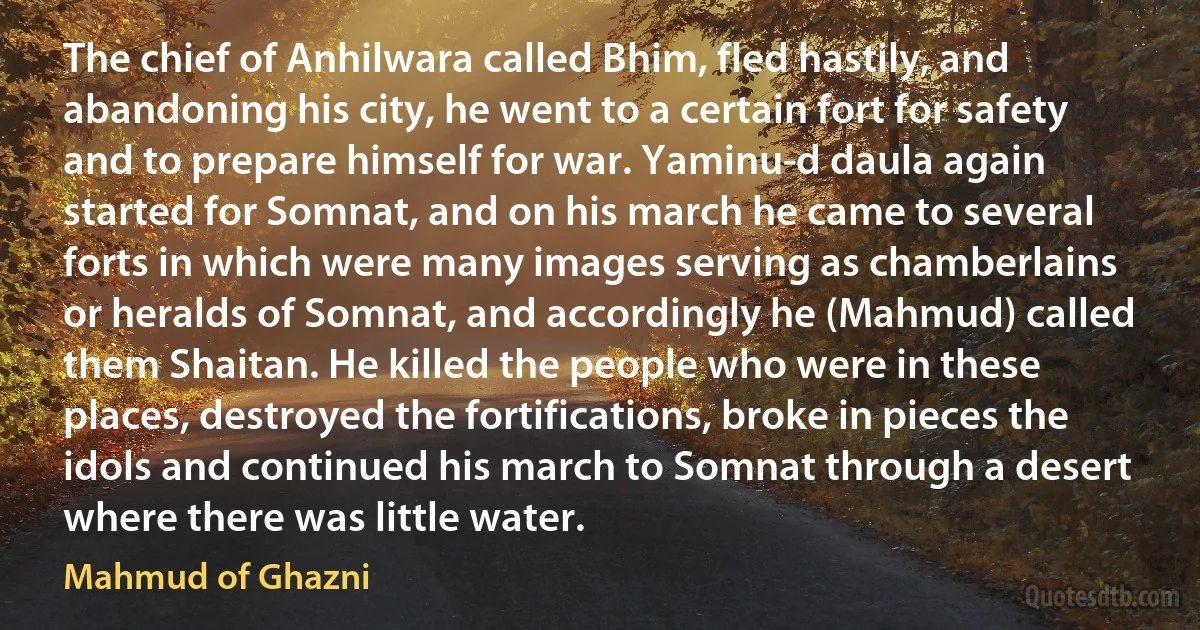Mahmud of Ghazni quotes
In this year, that is AH 412, Sultan Mahmud learnt that the people of Hindustan had turned against the Raja of Qanauj' Nand, the Raja of Kalinjar attacked Qanauj because Raja Kuwar (of Qanauj) had surrendered to Sultan Mahmud. As a result of this attack Raja Kuwar was killed. When Sultn Mahmud learnt it, he collected a large army and started towards Hindustam with a view to take revenge upon Raja Nanda. As the army of Musalmams reached the Jumna, the son of Raja Anand Pal stood in the way of Mahmud. The river of Jumna was in spate at this time and it became very difficult for the army to get across. But as chance would have it, eight royal guards of Mahmud showed courage and crossed the river they attacked the army of the Hindis and dispersed it, the son of anand Pal ran away with his chiefs. All the eight royal guards entered a city nearby and they plundered it to their heart's content. They demolished the temples in that place.

Mahmud of Ghazni
From that place [Mahawan] the Sultan advanced to Mathurah, which is a large city containing many temples' and the Sultan completely destroyed the city and burnt the temples. There was one golden idol which was broken up under the orders of the Sultan... Then in accordance with his custom, he advanced with his army towards Hindustan with the object of the conquest of Somnath' there were many golden idols in the temple in the city, and the largest of these idols was called Manat... When he reached Somnath, the inhabitants shut the gate on his face. After much fighting and great struggles the fort was taken, and vast multitudes were killed and taken prisoners. The temples were pulled down, and destroyed from their very foundations. The gold idol Somnath was broken into pieces, and one piece was sent to Ghaznin, and was placed at the gate of the Jami' Masjid; and for years it remained there.

Mahmud of Ghazni
Mahmud, as soon as his eyes fell on this idol, lifted up his battle-axe with much anger, and struck it with such force that the idol broke into pieces. The fragments of it were ordered to be taken to Ghaznin, and were cast down at the threshold of the Jami Masjid where they are lying to this day.

Mahmud of Ghazni
Mahmud was a man of great abilities, and is renowned as one of the greatest champions of Islam.... His influence upon Islam soon became widely known, for he converted as many as a thousand idol-temples into mosques, subdued the cities of Hindustan, and vanquished the Rais of that country. He captured Jaipal, who was the greatest of them, kept him at Yazd (?), in Khurasan, and gave orders so that he was bought for eighty dirams. He led his armies to Nahrwala and Gujarat, carried off the idol (manat) from Somnat, and broke it into four parts. One part he deposited in the Jami Masjid of Ghazni, one he placed at the entrance of the royal palace, the third he sent to Mecca, and the fourth to Medina.

Mahmud of Ghazni
The Sultan, contrary to the disposition of man, which induces him to prefer a soft to a hard couch, and the splendour of the cheeks of pomegranate-bosomed girls to well-tempered sword blades, was so offended at the standard which Satan had raised in Hind, that he determined on another holy expedition to that land.

Mahmud of Ghazni
Nasiru-d din [Subuktigin] died in the year AH 387 (AD 997) and the command of his troops descended to Mahmud by inheritance, and by confirmation of Nuh, son of Mansur. His victory over 'Abdu-l Malik, when that chieftain was put to flight, added much to his power, and he was confirmed in the government of Khorasan and Sijistan, and he received a robe of honour with the title of Sultan from the Khalif, who also made a treaty with him. In consequence of the complaints of the oppression practised by the descendants of Fakhru-d din Dailami, he marched towards Júrjan and 'Irak, and took the country from them. Afterwards he turned his arms towards Hind, and conquered many of its cities and forts. He demolished the Hindu temples and gave prevalence to the Muhammadan faith. He ruled with great justice, and he stands unparalleled among all the Muhammadan kings.

Mahmud of Ghazni
After a long time, in AH 400, Allah' conferred the honour of sultanate on Sultan Mahmud Ghazi, son of Subuktigin' Nine men from among the Afghan chiefs' took to his court and joined his servants' The Sultan' gave to each one of them enamelled daggers and swords, horses of good breed and robes of special quality and, taking them with him, he set out with the intention of conquering Hindustan and Somnat....'Rai Daishalim whom some historians have pronounced as Dabshalim or Dabshalam was the great ruler of that country. The Sultan inflicted a smashing defeat on that Raja, demolished and desecrated the idol temples there, and devastated that land of the infidels.

Mahmud of Ghazni
The linga he raised was the stone of Somnath, for soma means the moon and natha means master, so that the whole word means master of the moon. The image was destroyed by the Prince Mahmud, may God be merciful to him! - AH 416. He ordered the upper part to be broken and the remainder to be transported to his residence, Ghaznin, with all its coverings and trappings of gold, jewels, and embroidered garments. Part of it has been thrown into the hippodrome of the town, together with the Cakrasvamin, an idol of bronze, that had been brought from Taneshar. Another part of the idol from Somanath lies before the door of the mosque of Ghaznin, on which people rub their feet to clean them from dirt and wet.

Mahmud of Ghazni
The Sultan summoned the most religiously disposed of his followers, and ordered them to attack the enemy immediately. Many infidels were consequently slain or taken prisoners in this sudden attack, and the Musulmans paid no regard to the booty till they had satiated themselves with the slaughter of the infidels and worshippers of the sun and fire. The friends of Allah searched the bodies of the slain for three whole days, in order to obtain booty... The booty amounted in gold and silver, rubies and pearls, nearly to three thousand thousand dirhams, and the number of prisoners may be conceived from the fact, that each was sold for from two to ten dirhams. These were afterwards taken to Ghazna, and merchants came from distant cities to purchase them, so that the countries of Mawarau-n nahr, Irak and Khurasan were filled with them, and the fair and the dark, the rich and the poor, were commingled in one common slavery.

Mahmud of Ghazni
From that place the Sultan proceeded to a certain city, which was accounted holy by the people of the country. In that city the men of Ghaznin saw so many strange and wonderful things, that to tell them or to write a description of them is not easy' In short, the Sultan Mahmud having possessed himself of the booty, burned their idol temples and proceeded towards Kanauj..... The Ghaznivids found in these forts and their dependencies 10,000 idol temples, and they ascertained the vicious belief of the Hindus to be, that since the erection of these buildings no less than three or four hundred thousand years had elapsed. Sultan Mahmud during this expedition achieved many other conquests after he left Kanauj, and sent to hell many of the infidels with blows of the well tempered sword. Such a number of slaves were assembled in that great camp, that the price of a single one did not exceed ten dirhams.

Mahmud of Ghazni
The Sultan now received information that there was a city in Hindustan called Thanessar, and there was a great temple there in which there was an idol called Jagarsom, whom the people of Hindustan worshipped. He collected a large force with the object of carrying on a religious war, and in the year AH 402 marched towards Thanessar. The son of Jaipal having received intelligence of this, sent an envoy and represented through him, that if the Sultan would relinquish this enterprise, he would send fifty elephants as tribute. The Sultan paid no heed to this offer, and when he reached Thanessar he found the city empty. The soldiers ravaged and plundered whatever they could lay hands upon, broke the idols and carried Jagarsom to Ghaznin. The Sultan ordered that the idol should the placed in front of the place of prayer, so that people would trample upon it.

Mahmud of Ghazni
Sultan Mahmud at first designed in his heart to go to Sijistan, but subsequently preferred engaging previously in a holy war against Hind, and he distributed arms prior to convening a council on the subject, in order to secure a blessing on his designs, of exalting the standard of religion, of widening the plain of right, of illuminating the words of truth, and of strengthening the power of justice. He departed towards the country of Hind, in full reliance on the aid of Allah, who guiding by his light and by his power, bestowed dignity upon him, and gave him victory in all expeditions. On his reaching Purshaur (Peshawar), he pitched his tent outside the city...

Mahmud of Ghazni
The Sultan again resolved on an expedition to Hind, and marched towards Narain, urging his horses and moving over ground, hard and soft, until he came to the middle of Hind, where he reduced chiefs, who, up to that time obeyed no master, overturned their idols, put to the sword the vagabonds of that country, and with delay and circumspection, proceeded to accomplish his design. He fought a battle with the chiefs of the infidels, in which Allah bestowed upon him much booty in property, horses, and elephants, and the friends of Allah committed slaughter in every hill and valley. The Sultan returned to Ghazna with all the plunder he had obtained.

Mahmud of Ghazni
He now attacked the fort of Bhim, where was a temple of the Hindus. He was victorious, and obtained much wealth, including about a hundred idols of gold and silver. One of the golden images, which weighed a million mishkals, the Sultan appropriated to the decoration of the Mosque of Ghazni, so that the ornaments of the doors were of gold instead of iron.

Mahmud of Ghazni
This temple of Somnat was built upon fifty-six pillars of teak wood covered with lead. The idol itself was in a chamber; its height was five cubits and its girth three cubits. This was what appeared to the eye but two cubits were (hidden) in the basement. Yaminu'd daula seized it, part of it he burnt, and part of it he carried away with him to Ghazni, where he made it a step at the entrance of the Jami'-masjid.

Mahmud of Ghazni
After the Sultan had purified Hind from idolatry, and raised mosques therein, he determined to invade the capital of Hind, to punish those who kept idols and would not acknowledge the unity of Allah. He collected his warriors and distributed money amongst them. He marched with a large army in the year 404 H., 1013 AD during a dark night ... The Sultan returned, marching in the rear of this immense booty, and slaves were so plentiful that they became very cheap; and men of respectability in their native land, were degraded by becoming slaves of common shopkeepers. But this is the goodness of Allah, who bestows honours on his religion and degrades infidelity...

Mahmud of Ghazni
The chief marched out to meet his enemy, and fought for three days with the Musulmans. On the fourth he fled, and sought to get back into the city; but the Musulmans reached the gate before the fugitives, overpowered them, and disarmed them. A dreadful slaughter ensued, the women were dishonoured, and the property seized. When Bahira saw this destruction, he fled with some trusty followers to the tops of the mountains. Mahmud sent a force in pursuit, which overtook and surrounded the party, and put all the chiefs to the sword. Bahira saw that no hope was left, so he drew a dagger and killed himself. Mahmud remained in Bhdtia until he had settled its affairs, and drawn up rules for its governance. He then returned towards Ghazna, having appointed a representative at Bhatia to instruct the people who had become Muhammadans.

Mahmud of Ghazni
When Sultan Mahmud ascended the throne of sovereignty, his illustrious deeds became manifest unto all mankind within the pale of Islam when he converted so many thousands of idol temples into masjids. He led an army to Nahrwalah of Gujarat, and brought away Manat, the idol, from Somnath, and had it broken into four parts, one of which was cast before the entrance of the great Masjid at Ghaznin, the second before the gateway of the Sultan's palace, and the third and fourth were sent to Makkah and Madinah respectively.

Mahmud of Ghazni



